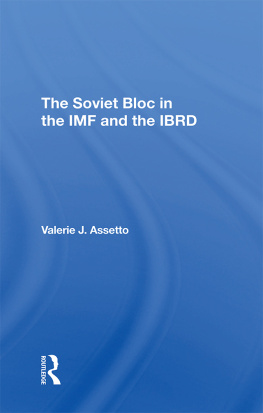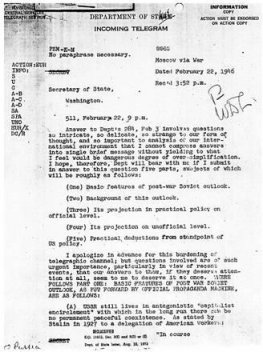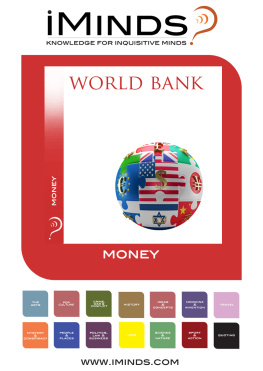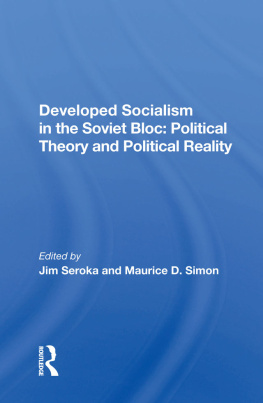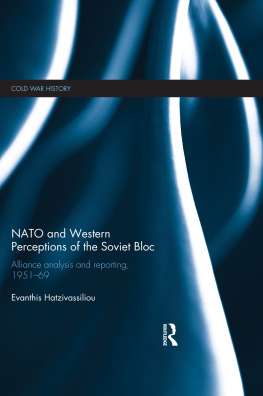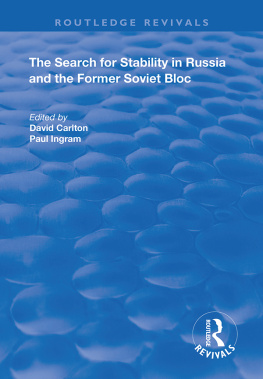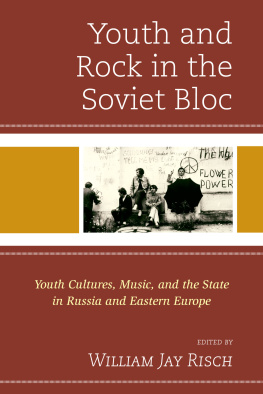The Soviet Bloc in the IMF and the IBRD
The Soviet Bloc in the IMF and the IBRD
Valerie J. Assetto
First published 1988 by Westview Press, Inc.
Published 2019 by Routledge
52 Vanderbilt Avenue, New York, NY 10017
2 Park Square, Milton Park, Abingdon, Oxon OX14 4RN
Routledge is an imprint of the Taylor & Francis Group, an informa business
Copyright 1988 Taylor & Francis
All rights reserved. No part of this book may be reprinted or reproduced or utilised in any form or by any electronic, mechanical, or other means, now known or hereafter invented, including photocopying and recording, or in any information storage or retrieval system, without permission in writing from the publishers.
Notice:
Product or corporate names may be trademarks or registered trademarks, and are used only for identification and explanation without intent to infringe.
Library of Congress Cataloging-in-Publication Data
Assetto, Valerie J.
The Soviet Bloc in the IMF and the IBRD.
(Westview special studies in international economics)
Bibliography: p.
Includes index.
1. International Monetary FundEurope, Eastern.
2. World BankEurope, Eastern. 3. Loans, Foreign
Europe, Eastern. I. Title. II. Title: Soviet bloc
in the I.M.F. and the I.B.R.D. III. Series.
HG3881.5.I58A76 1988 332.1'52 86-7800
ISBN 13: 978-0-367-29596-7 (hbk)
To my family: Val, Joan, Gary, Richard, Gayle, and Stephen
Several persons and organizations contributed to the successful completion of this project. The International Research and Exchanges Board (IREX) supported the early stages of the research through a Preparatory Fellowship and an Exchange Fellowship. Dr. Charles M. Loeffler and Ms. Patsy Smith also contributed their expertise in the construction of earlier versions of the manuscript. Colorado State University provided assistance for final production of the manuscript. Ms. Gayle Assetto, Ms. Terry Lane, and Mr. Emmett Lombard also contributed their time toward the completion of the final manuscript. Finally, I wish to express my heartfelt gratitude to Dr. Stephen P. Mumme, Colorado State University, for his continuous encouragement, support, advice, and assistance. I assume complete responsibility, however, for the analysis and material contained within.
Valerie J. Assetto
1
Perspectives on IMF and IBRD Lending
One of the most significant developments in the post-war international economic system is the startling increase in the level of financial assistance provided by private and public agencies. Both bilateral and multilateral financial institutions have attempted to satisfy the need of modern nation-states for substantial amounts of financial assistance. Aid agencies and commercial banking institutions in the developed states of North America and Western Europe supply large amounts of funds to the rest of the world but the largest single sources of official international financial assistance, particularly to developing nations, are two specialized agencies of the United Nations, the International Monetary Fund (IMF) and the International Bank for Reconstruction and Development (IBRD or World Bank). These two agencies provide the bulk of multilateral economic assistance and balance of payments financing in the present international economy.
The purpose of this study is to examine the impact of political, non-economic factors in IMF and IBRD operations and decisions to lend using the Eastern European members of both organizations as case studies. Numerous critics of the Bank and Fund such as Cheryl Payer contend that political factors permeate the self-proclaimed technical decisions of the Bank and Fund, to the detriment of the socialist and developing countries. This analysis investigates that claim by focusing on the influence of political factors, such as ideology, on the relationship of two international financial organizations, the IMF and IBRD, and a particular class of their members, the socialist states of Eastern Europe.
The constitutions and bylaws of international agencies for economic assistance typically prohibit the inclusion in decisions to lend of any but economic or technical criteria. Yet, as will be shown, various political criteria do, in fact, affect certain lending decisions. While the decision to finance a highway in a remote area or to bolster a declining balance
The specialized agencies of the United Nations have been frequent targets of the charge of "politicization" from both ends of the political spectrum. The implicit criticism here is that "the agencies are being used as forums for political debate rather than the functional tasks for which they were founded" and that they are engaging in activities which are predicated upon political criteria. However, as Lyons, et al., note, U.N. agencies are inherently political in their origins and activities (p. 83) and thus it is almost inevitable that these agencies would be subject to such criticism. The Bank and the Fund are not exceptions.
The forms that political factors may take and the points in the lender's decision-making processes in which political inputs enter influence how these factors impact upon the operations of international economic organizations. It is the central thesis of this analysis that political factors may appear in the lending decisions of the IMF and the IBRD only under certain circumstances which are determined by the attributes and policies of the borrower and only at certain stages of the decision-making process.
There are numerous reasons why the weight of political inputs in the lending policies and decisions of the international lending agencies is of critical importance to borrowers. Official statements by these international economic organizations offer a borrower few guidelines for assessing its position with respect to political criteria. Some clues to political criteria may be derived from the constitutions or regulations of these agencies, but more often political inputs are well-disguised. Knowledge of the impacts of political criteria on the level and conditions of loans from international financial organizations can assist a borrower immeasurably in preparing a stabilization or development program or a set of projects which international lenders are likely to fund. A borrower may even be able to develop a loan application strategy using the results from the analysis of the impact of political criteria to anticipate and avoid major conflicts with the lender.
Analysis of the impact of political criteria in the lending policies of international economic organizations may also enable the borrower and the lender to minimize the unexpected effects of lender policies on the borrower's political and economic system. This factor could be critical to a country which is trying to preserve its unique political and economic system in the face of what it perceives to be intense international hostility. The subtle influence of the lender's ideology or procedural biases can often divert the borrower from its intended goals, although this may or may not be an intentional consequence of the lender's policies. Recognition of such a possibility gives the borrower (or the lender) the opportunity to counteract any undesirable influences which may result from the lender's operations, either in a case-by-case fashion or as part of a comprehensive set of reforms.
The decision to focus this study on the lending policies of the Fund and the Bank underscores several important aspects of international development assistance. Theoretically, multilateral aid yields less potential for political influence than does bilateral aid. It follows, therefore, that an international lending agency should be able to restrict the basis for its decisions more easily to economic criteria than would an agency or organization of a single lending state. An international organization is composed of many states whose political criteria for lending may conflict with and/or cancel one another, whereas bilateral aid subjects the borrower to the lending criteria of a single state. In the case of the Fund and the Bank, the fact that these organizations' members exhibit a wide variety of political and economic values and structures, which theoretically should increase tolerance of deviance, further reduces the potential for influence of political criteria in lending decisions to those countries.


